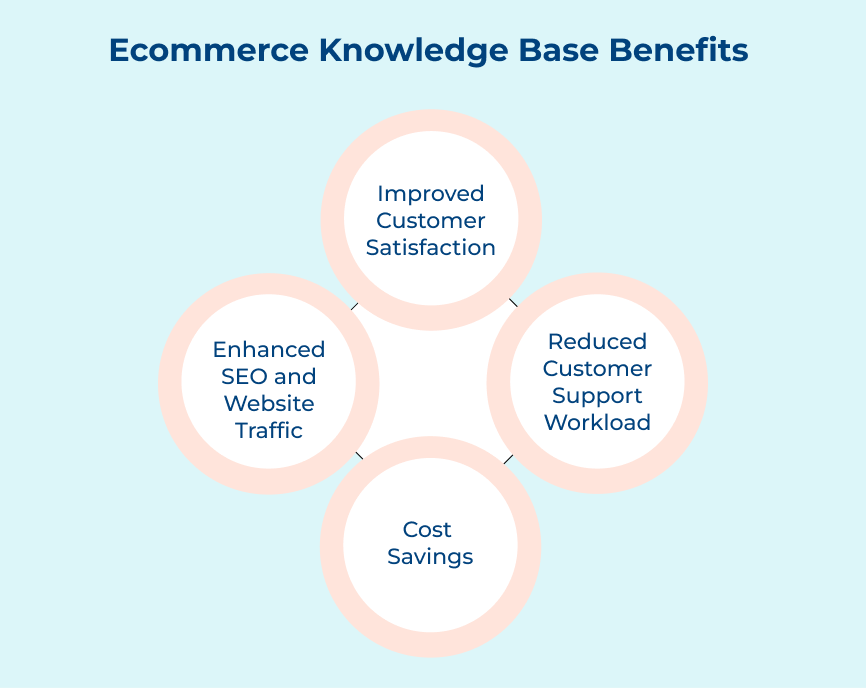1. Product information: Include detailed information about your products, such as descriptions, specifications, images and videos. It will help customers understand what they are buying and make informed purchasing decisions. Organize the information into categories and provide search functionality for easy navigation.
2. Ordering and shipping process: Outline the steps for placing an order on the ecommerce website, including adding items to the cart, selecting shipping options and making payments. Inform customers about any order tracking systems you have in place. Explain your shipping policies, including shipping methods, delivery times and fees.
3. Return and refund policy: Clearly articulate your return and refund policies to ensure customers know what to expect in case they need to initiate a return. Explain the process for returning a product, any conditions or restrictions and the refund timeline. It will help build trust and confidence in the brand.
4. Frequently asked questions (FAQs): Creating an FAQ page is an effective way to compile a list of common questions that customers may have about your products, services or policies. Address these questions with detailed and concise answers. FAQs are an effective way to provide solutions to customers’ queries, saving them time and effort.
5. Troubleshooting guides: Create troubleshooting guides for common issues customers may face when using your products or navigating the website. Include step-by-step instructions, screenshots, or videos to help customers resolve the problem independently. It will reduce the number of support tickets and enhance customer satisfaction.
Top 5 E-Commerce Knowledge Base Examples
Below are the top Commerce knowledge base examples that illustrate best practices and inspire you to transform your own customer support strategy.
1. Amazon
Amazon is a prime example of a brand that has successfully implemented a knowledge base for ecommerce. Their knowledge base is filled with articles, FAQs and tutorials that address common issues or provide solutions. It is regularly updated to ensure accurate and relevant information.
Businesses can learn from Amazon’s approach by creating a knowledge base that addresses their customer’s needs, reduces support inquiries and enhances the overall customer experience. It has helped Amazon establish itself as a leader in the ecommerce industry and has gained customer loyalty.
2. AliExpress
AliExpress is an online retail platform that is owned by the e-commerce giant, Alibaba. It serves as a marketplace for businesses and individuals to sell their products to customers worldwide. As an example of a brand that has successfully implemented an e-commerce knowledge base, AliExpress has revolutionized the customer experience.
The comprehensive resource enables customers to find answers to their queries quickly, reducing the need for direct customer service assistance. Other businesses can follow AliExpress’ lead by developing a robust knowledge base, improving customer satisfaction and reducing support costs. The implementation has positively impacted AliExpress by streamlining their operations and promoting customer loyalty.
3. eBay
eBay provides a platform for individuals and businesses to buy or sell goods. The knowledge base on eBay includes comprehensive resources or guides that help both buyers and sellers navigate the platform effectively. eBay has implemented one of the best ecommerce knowledge base by creating a user-friendly interface and organizing information into easily accessible categories.
Businesses can learn from eBay’s approach by building a robust knowledge base that addresses common customer inquiries and empowers users to find solutions independently. The implementation has greatly impacted eBay’s success by promoting customer satisfaction, reducing support costs and promoting self-service capabilities.
4. Zappos
Zappos has become an exemplary brand that successfully implemented an ecommerce knowledge base. Owing to its friendly and easy-to-use website, Zappos has gained a loyal customer base. The company’s knowledge base includes detailed product information, helpful tutorials and frequently asked questions, which streamline the customer experience.
Other businesses can learn from Zappos and implement a robust knowledge base to enhance their online presence. Providing valuable information and resources enables companies to establish themselves as trusted sources and create a positive impact for their customers. Zappos’ success demonstrates the importance and effectiveness of a knowledge base.
5. Zalando
Zalando is the perfect example of a brand that has successfully implemented an ecommerce knowledge base to improve its retail customer service. Its wide range of products and strong online presence have enabled Zalando to establish itself as a go-to destination for fashion-conscious shoppers.
The knowledge base has enabled Zalando to personalize recommendations, offer tailored promotions and provide valuable insights to customers. The implementation has not only enhanced the shopping experience but has also boosted customer loyalty and satisfaction, making Zalando a thriving player in the ecommerce industry.
Simplify Ecommerce with Veemo’s Easy-to-Use Knowledge Base
Veemo’s easy-to-use knowledge base simplifies and streamlines the ecommerce experience, making it easier for businesses to navigate the intricacies of online selling. The user-friendly interface and comprehensive information enable Veemo to provide a centralized hub for all ecommerce related questions and concerns.
Veemo’s knowledge base offers valuable insights and step-by-step guides to help you optimize your online presence. From setting up an online store to managing inventory and customer support, Veemo is your go-to resource for all things ecommerce. Simplify your ecommerce journey with Veemo’s easy-to-use knowledge base today.














